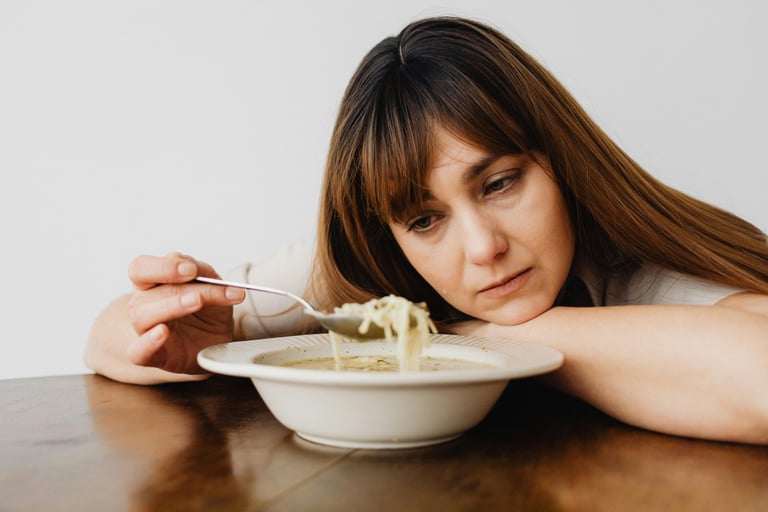ADHD and Eating: Overcoming the Challenges of Maintaining a Balanced Diet
MENTAL HEALTH
Beverly Carey
9/5/20252 min read
Living with Attention Deficit Hyperactivity Disorder (ADHD) can present unique challenges in various aspects of life, including maintaining a balanced diet. The symptoms of ADHD, such as impulsivity, hyperactivity, and executive dysfunction, can often interfere with healthy eating habits. However, with some practical strategies and a mindful approach, individuals with ADHD can overcome these challenges and achieve a balanced and nourishing diet.
Meal Planning and Structure: Establishing a structured meal plan can greatly benefit individuals with ADHD. Plan regular meal and snack times to ensure consistent energy levels throughout the day. Additionally, consider including a variety of nutrient-dense foods, such as fruits, vegetables, whole grains, plant-based proteins, and healthy fats. These foods provide essential vitamins and minerals needed for optimal brain function.
Matching meals to medications: Some individuals may experience an altered appetite while taking ADHD medications. If this is you, make sure to plan your day around your appetite. For example, if you are hungrier in the morning before taking your medication, it may work better to have a large meal in the morning. If aren’t hungry in the morning, it may be better to have a large meal when the medication wears off during the evening. If you are losing over 10 to 15 pounds, you may need to talk to a Registered Dietitian about strategies to prevent malnutrition or your doctor about dosing your medication.
Make a list of foods that you crave: You don’t have to eat with the latest trends. You don’t have to eat Kale and Acai because the media is telling you to. There may be plenty of healthy foods that you can muster up enough appetite to eat while on medication. You can eat these in smaller portions throughout the day. Make a list of those foods you do like and see if you can add a healthy spin. Some examples are: whole wheat crackers, baby carrots, sandwiches with good sauces, strawberries (experiment and make them chocolate covered), watermelon, nuts, and trail mix.
Meal prep during days with better executive function: whether you take medication or just have a good nights sleep and are plenty hydrated, it may be helpful to plan 3-4 days of meals while you feel your best. Make sure you optimize taste as well as health, as this will give you the motivation to keep going and may even make you excited to eat on days you feel “off.”
Be mindful of sensory difficulties: If you don’t like frozen and thawed food, don’t force yourself to eat it. Stay away from textures that give you the “icks” and eat nice fresh textures so next time you go to eat you will remember the last experience as a good one. If you don’t like getting dirty dish water all over your hands, pick-up a dish washing brush with a handle to minimize touching.
Seeking Professional Support: If you are struggling to manage your diet and ADHD symptoms, it is essential to consult with a registered dietitian. A dietitian can provide personalized guidance, create tailored meal plans, and address specific nutrient deficiencies. They can also help you navigate any potential food sensitivities or allergies that might impact your ADHD symptoms.
Although maintaining a balanced diet can be challenging for individuals with ADHD, it is not impossible. By incorporating the strategies mentioned above, individuals with ADHD can overcome these challenges and establish healthy eating habits. Remember, small, sustainable changes can make a significant difference in managing ADHD symptoms and improving overall well-being.


Nutrition
Empowering you with straight-forward nutrition guidance.
Support
Health
help@therealdietitian.net
© 2025. All rights reserved.
AI may be used in some writing for sentence structure and paragraph organization. However, all ideas are based on my own clinical judgement and evidence-bases such as scientific studies and professional guidelines.